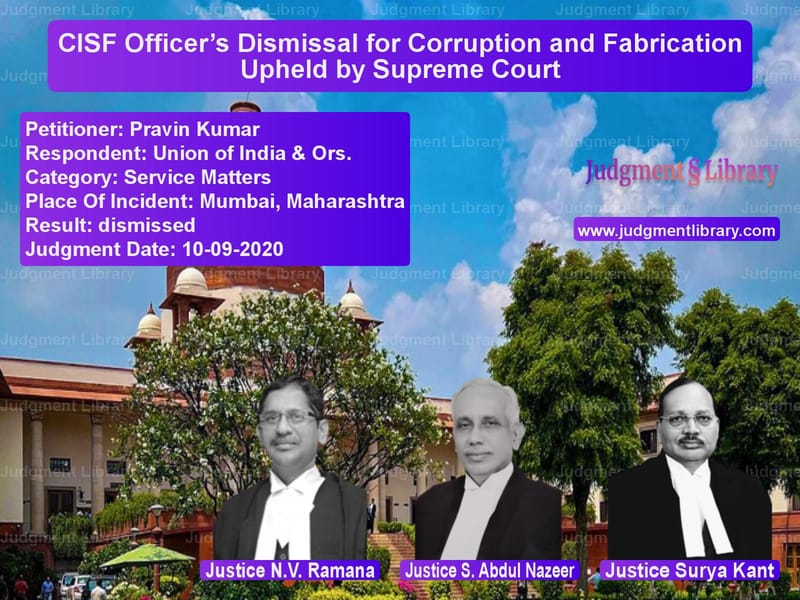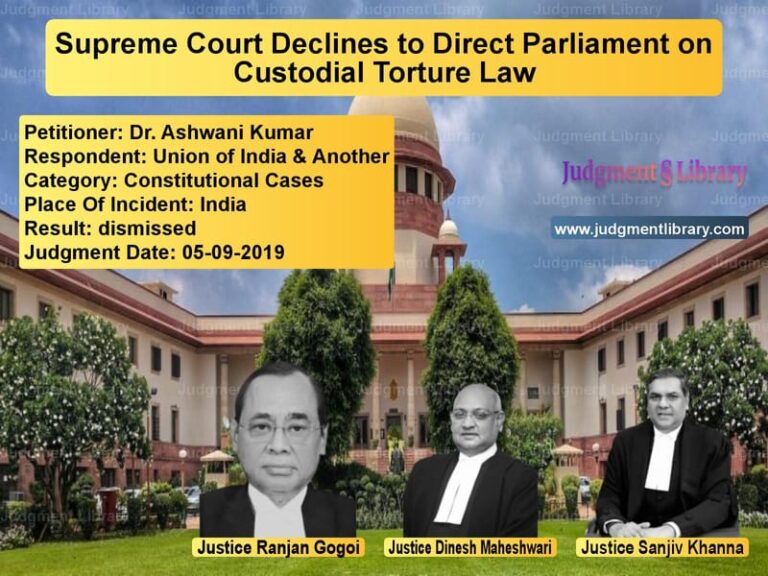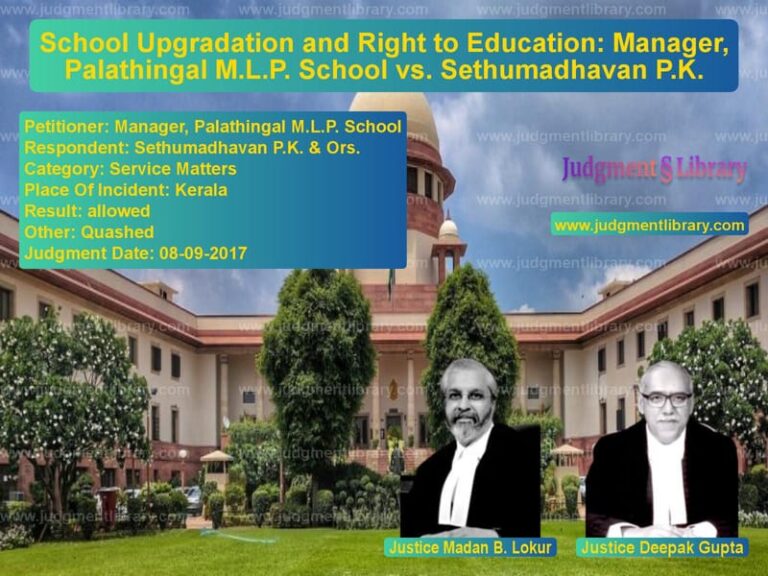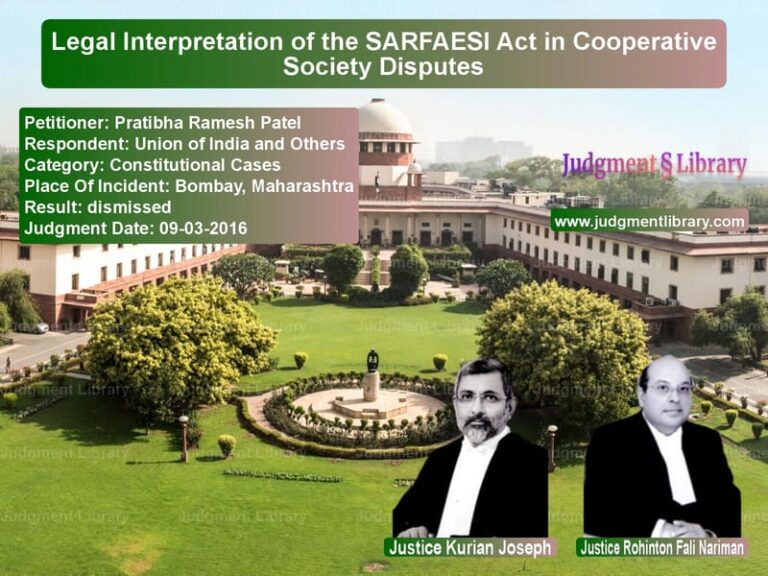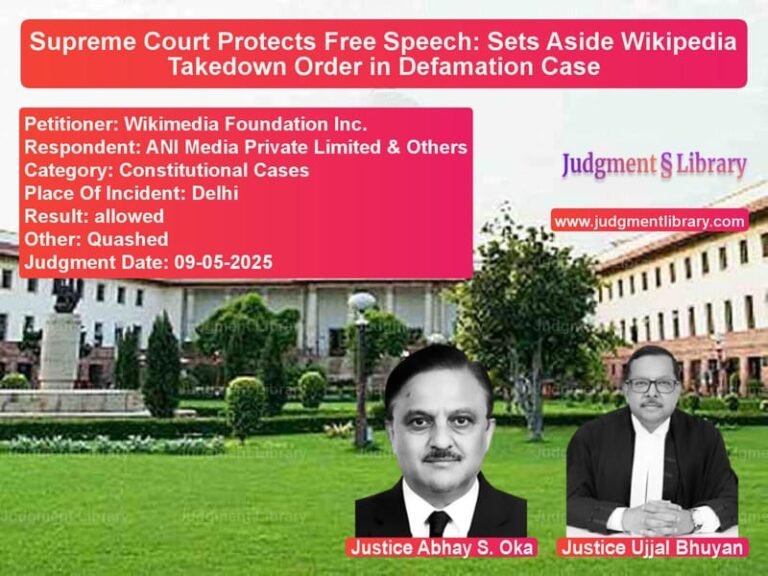CISF Officer’s Dismissal for Corruption and Fabrication Upheld by Supreme Court
The case of Pravin Kumar vs. Union of India & Ors. revolves around the dismissal of a Central Industrial Security Force (CISF) officer on charges of corruption, fabrication of records, and intimidation of witnesses. The Supreme Court was called upon to decide whether the disciplinary proceedings were conducted fairly and whether the penalty of dismissal was proportionate to the charges.
The appellant, Pravin Kumar, challenged the Bombay High Court’s decision, which had upheld his dismissal from service. The Supreme Court, after a thorough examination of the evidence, upheld the dismissal, ruling that corruption and falsification of records in a paramilitary force warranted the severest punishment.
Background of the Case
The appellant joined the CISF as a Sub-Inspector in January 1995 and was later posted at the Bharat Petroleum Corporation Ltd. (BPCL) unit in Mumbai. By July 1997, he was assigned to the Crime and Intelligence Wing, where he was specifically entrusted with conducting surprise searches and taking action against corruption.
On February 28, 1999, an incident occurred that led to his suspension and subsequent dismissal:
- Constable Ram Avtar Sharma (CW-1) was caught carrying Rs. 10,780 in cash near the BPCL compound.
- Inspector Hiralal Chaudhary (PW-1) became suspicious and conducted a search, during which Sharma failed to provide a satisfactory explanation for the cash.
- A conflicting entry was later made in the General Diary (GD) at BPCL’s main gate, falsely stating that Rs. 9,000 was given as a personal loan to Sharma.
- Investigations revealed that the appellant had orchestrated this false entry and pressured subordinates to support his fabricated version.
- The money was allegedly collected as bribes from contractors, allowing the smuggling of iron scrap and brass from the BPCL compound.
Petitioner’s Arguments
The appellant, Pravin Kumar, contended:
- The disciplinary proceedings were biased and predetermined.
- There was no direct evidence linking him to corruption, and key witnesses retracted their statements.
- The enquiry officer acted unfairly by putting leading questions to prosecution witnesses.
- The penalty of dismissal was excessive, especially when the Central Bureau of Investigation (CBI) had not pursued criminal charges against him.
- His dismissal was based on conjecture and hearsay rather than concrete evidence.
Respondent’s Arguments
The Union of India countered:
- The appellant manipulated official records and intimidated subordinates to cover up corruption.
- Multiple witnesses confirmed that bribes were being collected under his supervision.
- The disciplinary proceedings adhered to principles of natural justice, with the appellant given opportunities to cross-examine witnesses and present his defense.
- Even though no criminal charges were filed, departmental proceedings operate on the principle of preponderance of probabilities, and his misconduct was clearly established.
- The dismissal was proportionate given the gravity of the misconduct, which compromised the integrity of a paramilitary force.
Supreme Court’s Key Observations
The Supreme Court analyzed the evidence and legal principles governing disciplinary proceedings. It observed:
“Judicial review is an evaluation of the decision-making process, not the merits of the decision itself. The inquiry must be fair, follow due process, and be based on some evidence, but courts will not act as appellate authorities in disciplinary matters.”
The Court further noted:
- Judicial review in service matters is limited to ensuring fairness in disciplinary proceedings, not re-evaluating evidence.
- The appellant’s actions involved systematic corruption, fabrication of records, and intimidation of witnesses, warranting the highest disciplinary penalty.
- The CBI’s decision not to file criminal charges did not preclude disciplinary action under service rules.
- The inquiry officer’s questioning of witnesses was within procedural norms and did not indicate bias.
- Dismissal from service was justified given the appellant’s rank and the trust placed in him to combat corruption.
Legal Precedents Considered
The Supreme Court referred to multiple legal precedents to support its findings:
- BC Chaturvedi vs. Union of India (1995) 6 SCC 749: Held that judicial review in disciplinary cases is limited to procedural fairness.
- Union of India vs. T.R. Varma (1958 SCR 499): Stated that disciplinary proceedings require adherence to natural justice but are not bound by strict rules of evidence.
- Jameel vs. State of Uttar Pradesh (2010) 12 SCC 532: Clarified that proportionality in punishment depends on the nature and impact of the misconduct.
- Karnataka SRTC vs. MG Vittal Rao (2012) 1 SCC 442: Affirmed that departmental inquiries operate on the principle of preponderance of probabilities.
Final Judgment
The Supreme Court dismissed the appeal and upheld the dismissal order:
“The charges against the appellant—corruption, fabrication of official records, and intimidation—strike at the very integrity of the force. His conduct was unbecoming of a CISF officer, and dismissal from service is the only appropriate penalty.”
Implications of the Judgment
This ruling has significant implications for service jurisprudence and disciplinary proceedings:
- It reinforces that judicial review in disciplinary matters is limited to ensuring fairness, not re-evaluating evidence.
- It upholds the principle that corruption in law enforcement and paramilitary forces warrants strict penalties.
- It establishes that departmental proceedings can proceed independently of criminal investigations.
- It clarifies that proportionality in disciplinary action must be judged in the context of the trust and responsibility associated with the officer’s role.
With this judgment, the Supreme Court has reaffirmed that disciplinary authorities have the discretion to impose severe penalties in cases of corruption and misconduct, ensuring the integrity of paramilitary forces and law enforcement agencies.
Petitioner Name: Pravin Kumar.Respondent Name: Union of India & Ors..Judgment By: Justice N.V. Ramana, Justice S. Abdul Nazeer, Justice Surya Kant.Place Of Incident: Mumbai, Maharashtra.Judgment Date: 10-09-2020.
Don’t miss out on the full details! Download the complete judgment in PDF format below and gain valuable insights instantly!
Download Judgment: Pravin Kumar vs Union of India & Ors Supreme Court of India Judgment Dated 10-09-2020.pdf
Direct Downlaod Judgment: Direct downlaod this Judgment
See all petitions in Disciplinary Proceedings
See all petitions in Termination Cases
See all petitions in Public Sector Employees
See all petitions in Judgment by N.V. Ramana
See all petitions in Judgment by S. Abdul Nazeer
See all petitions in Judgment by Surya Kant
See all petitions in dismissed
See all petitions in supreme court of India judgments September 2020
See all petitions in 2020 judgments
See all posts in Service Matters Category
See all allowed petitions in Service Matters Category
See all Dismissed petitions in Service Matters Category
See all partially allowed petitions in Service Matters Category

